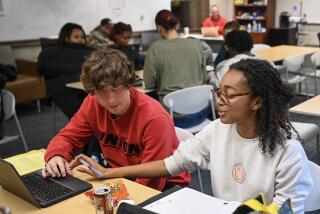Cheating in School Reflects Basic Confusion in Society
- Share via
We are getting the message on cheating. Judging by the rhetoric of numerous newspaper and magazine articles and survey results lately, the public has come to understand that a) cheating in school is a serious issue, and b) it is up to classroom teachers to stop it.
And what do our children’s teachers think about cheating? They think it is wrong, but they don’t think it will diminish unless we think more carefully about what test scores tell us--and don’t tell us--about learning.
In my conversations with many elementary and secondary teachers over the past few months, they have told me they believe that cheating in school focuses a spotlight on some basic confusion in our society’s views of learning and academic testing--and what accountability really means.
Teachers, especially veteran teachers, believe they have more effective strategies for engaging children in significant learning than ever before. Yet the kinds of testing by which they and their students are judged have not changed in any significant way, largely because the more complex testing methods are significantly more expensive than those most widely used today.
Over the past 20 years, K-12 teachers have altered their strategies for engaging students in learning in some fundamental ways. Indeed, what is regarded as learning has changed as well. It is no longer “learning” to be able to remember an isolated fact or formula just long enough to answer a test question. Extensive research has convincingly demonstrated that we learn best when we figure out how new facts and methods and theories fit in with what we already know. This is often called a constructivist theory of learning, one that is roundly condemned on the basis of that word alone; but in fact, it is an empirically based model of what most of us know to be the way we learn. When we really understand something--a principle of physics, the quadratic equation, the meaning of a word--we can apply what we now know in any number of new situations.
In response to these findings, one critical change in classroom practices is the use of strategies that allow students to explore and exchange information with each other as they learn things. Not only do these strategies acknowledge what everyone has always known--that students are different from each other and learn at different paces--but it also harnesses the power of that diversity to enhance everyone’s learning. (It is also true that this teaching strategy--collaborative work in groups--is not always effectively implemented and that, in some groups, one or two members do all of the work, and the full group gets to bask in the credit for that work--which is a form of cheating.)
However, despite its demonstrable effectiveness in the hands of skilled teachers, this collaborative model for learning is represented in almost none of the high-stakes standardized testing that is done in the United States to measure student progress. There is almost no effective way, for example, to distinguish quality work produced by collaborative groups from shabby work. Nor can we effectively assess the quality of teamwork and collaboration, which would mean that individual performance would not be the primary focus.
Instead, the model for testing student achievement remains a model of individual, solitary work. The kinds of questions most often posed in these tests are largely multiple-choice, suggesting that learning can be represented by recalling separate nuggets of information. We value much more highly the numerical scores on standardized tests than any other information we may gather about the status of a student’s learning. It is on the results of these tests that parents judge teachers, that administrators and teachers are judged by the public, and that many critical decisions about children’s futures are determined.
Teachers see this mismatch between effective learning and testing as a fundamentally important issue when they discuss cheating. In the most effective teaching they do, they encourage children to exchange information, to help each other and to collaborate. And they acknowledge just how complicated learning and understanding really are, and in how many ways complex ideas can be understood. Yet in some of the most critical performances their students undertake--standardized tests--teachers must tell students to stop talking with each other, to refuse to assist each other and to find single and best answers to questions that often have no context.
It is the result of this test performance--not the learning--that our society values. Indeed, we are using just this kind of test result to judge the effectiveness of teachers’ work, with virtually no other evidence presented of student learning.
Small wonder, teachers say, that students attempt to affect these outcomes by whatever means they can. And teachers, while they recognize their role in preventing cheating and/or punishing cheaters, harbor fundamental doubts about the value of the whole testing enterprise.
In addition to this conflict between learning and testing, teachers are caught up in another contradictory set of expectations: Parents, legislators and the general public seem to want teachers to enforce a set of values the larger society flouts with impunity.
Teachers are particularly frustrated when parents reveal at home some pride in beating the system--cheating on income taxes, fooling a boss or supervisor, taking supplies from a workplace to use at home--yet want teachers to come down hard on students who cheat. More frustrating still, some of these same parents might be tempted to look the other way if their children get a higher score on a test with the teacher’s help.
The teachers I’ve spoken with find it very curious that the growing emphasis in business on teamwork, diversity and globalism has not shaped the education of our future business leaders--our children. Though experienced teachers believe they know the way to prepare students for the world they will occupy as adults, the tests that are used to distribute educational rewards--bonuses to schools for high scores or student admission to special programs or classes, for example--are not designed to elicit any information at all about these developed skills and abilities.
What’s worse is that, by testing for limited things, and by placing an extremely high value on the results of that testing, we’re skewing our value system in education and inviting a culture of cheating that will leave its own legacy in society.






